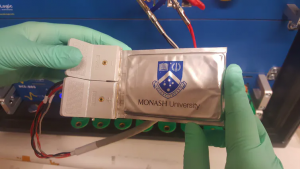by Mahdokht Shaibani, via Energy Post

The rapid expansion of electric power across the world is putting a strain on battery production. The standard lithium-ion battery depends on minerals and metals in limited supply, so alternatives are needed urgently. Mahdokht Shaibani at Monash University describes the work of her team on developing lithium-sulphur batteries. There are many advantages, not least the abundance of sulphur, the 16th most common element on Earth. Added to that, theory suggests they can store six times the energy as Li-ion for a given weight. The big challenge is battery life. Performance deteriorates rapidly due to the cycle of swelling and shrinking as this powerful battery charges and discharges. The team say they have solved this by creating a “binder” with a web-like network that leaves plenty of space for material to expand. It’s easy and cheap to manufacture. They are aiming for a commercial product in 2-4 years. No prediction can ever know what breakthrough innovations are round the corner that can make the Transition a success. Could this be one of them?
Lithium-ion batteries have changed the world. Without the ability to store meaningful amounts of energy in a rechargeable, portable format we would have no smartphones or other personal electronic devices. The pioneers of the technology were awarded the 2019 Nobel Prize for chemistry.
But as society moves away from fossil fuels, we will need more radical new technologies for storing energy to support renewable electricity generation, electric vehicles and other needs.